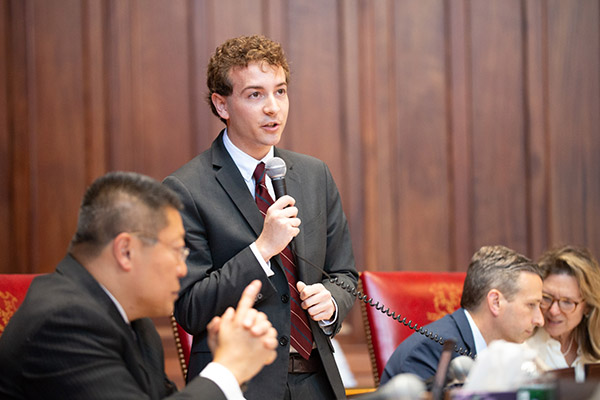Connecticut Senate to Debate
Joining the Rest of the Modern World and
Establishing Paid Family and Medical Leave
CT would join 183 other countries, six states, and Washington, D.C.
HARTFORD, CT (May 22, 2019) – Today, the Connecticut State Senate will debate and vote on creating a statewide paid family and medical leave program to provide necessary benefits to Connecticut residents in order to care for a newborn or a sick family member.
State governments across the United States are beginning to enact family and medical leave programs to catch up with other modern countries which have had similar programs on the books for years. According to the United Nations’ International Labor Organization, 183 of the 185 countries and territories surveyed provide some sort of paid maternity leave.(1) Across the 41 countries in the Organisation for Economic Co-operation and Development and the European Union, the United States is the only nation that does not provide any paid leave for new parents.(2)
In addition, the program reflects the needs of the changing dynamic of working households in the United States. The percentage of two-parent households in which both parents work full time was 31% in 1970 and increased to 46% in 2015. Similarly, the percentage of two-parent households in which the dad is full time and the mom is not employed has shrunk from 46% in 1970 to 26% in 2015.(3)
The bill would have Connecticut join California, the District of Columbia, Massachusetts, New Jersey, New York, Rhode Island, and Washington, which all have paid family and medical leave programs.(4) The details of the bill include:
Length of Paid Leave
Connecticut employees will be eligible for 12 weeks of paid family and medical leave. If an employee experiences a pregnancy-related serious health condition that results in incapacity then the employee would be eligible for 14 weeks.
Similarly, state programs in Massachusetts and Washington state provide 12 weeks of paid leave. Washington also provides an additional two weeks for serious pregnancy-related health conditions. However, in Massachusetts employees are eligible for 20 weeks of paid leave for their own serious health condition.
Reasons for Paid Leave
Connecticut employees would be able to use paid family and medical leave for five reasons:
- Care for a new child (birth, adoption, foster)
- Care for family member with serious health condition
- Care for own serious health condition
- Qualifying exigency arising out of family member being on active duty
- To serve as an organ or bone marrow donor
- New York, Washington state, and Massachusetts allow reasons one through four. Connecticut would be the only state in the country to allow for paid leave due to donating bone marrow or an organ. (5)
Definition of Family Member
Connecticut’s definition of a family member would align with that of New Jersey and include:
- Child
- Parent
- Spouse
- Domestic partner
- Grandparent
- Grandchild
- Individual related to the employee by blood or affinity whose close association the employee shows to be the equivalent of those family relationships
Benefit Amount
Beginning January 1, 2022, the weekly benefit for Connecticut employees will be 95% of 40 times the minimum wage and 60% on earnings above the minimum wage. The maximum weekly benefit can not exceed 60 times the minimum wage which is the equivalent of $780 on a $13 minimum wage, $840 on a $14 minimum wage, and $900 on a $15 minimum wage.
Connecticut’s benefits align similarly with other states. The maximum weekly benefit in California is $1,252, $1,000 in the District of Columbia, and $850 in Massachusetts. (6)
Employees Covered
In Connecticut paid leave will apply to private sector employers with one or more employees. Self-employed employees and sole-proprietors have the ability to opt-in to the program. In addition, non-union state and local government employees are covered. Unionized workers will have the ability to collectively bargain and become covered.
Similarly all private sector employers are covered in state paid leave programs in California, the District of Columbia, Rhode Island, Massachusetts, and Washington state. (7)
Program Funding
In Connecticut both personal disability leave and family care leave will be funded by the employee only. The withholding rate is 0.5 (one-half of one) percent on earnings up to the Social Security wage base.
For comparison, other states fund paid leave programs through either the employee only or a combination of the employee and the employer. In California, both personal disability and family care are funded by the employee only at one percent of a worker’s first $118,371 in wages. Additionally in Rhode Island, both personal disability and family care are funded by the employee only at 1.1 percent of a worker’s first $71,000 in wages. (8)
Sources
(1) http://www.ilo.org/wcmsp5/groups/public/—dgreports/—dcomm/—publ/documents/publication/wcms_242615.pdf
(2) http://www.oecd.org/els/soc/PF2_1_Parental_leave_systems.pdf
(3) https://www.pewsocialtrends.org/2015/11/04/raising-kids-and-running-a-household-how-working-parents-share-the-load/
(4) http://www.nationalpartnership.org/our-work/resources/workplace/paid-leave/state-paid-family-leave-laws.pdf
(5) http://www.nationalpartnership.org/our-work/resources/workplace/paid-leave/state-paid-family-leave-laws.pdf
(6) http://www.nationalpartnership.org/our-work/resources/workplace/paid-leave/state-paid-family-leave-laws.pdf
(7) http://www.nationalpartnership.org/our-work/resources/workplace/paid-leave/state-paid-family-leave-laws.pdf
(8) http://www.nationalpartnership.org/our-work/resources/workplace/paid-leave/state-paid-family-leave-laws.pdf
